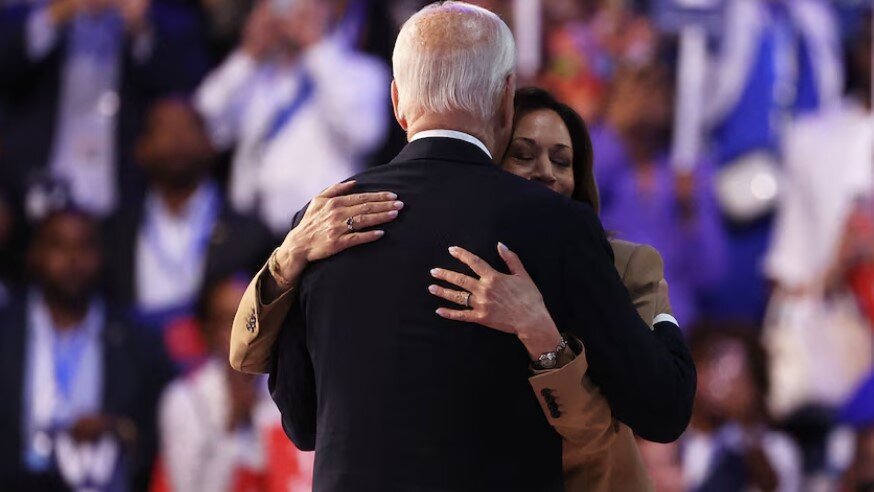Portland’s Alex Murphy was on the ground at Chicago’s United Center for the final night of the Democratic National Convention, where it was vice-president Kamala Harris’ turn to set out her vision for the country.
The highlights
The Democratic Party has not always had an easy relationship with star-spangled patriotism – but at the close of this year’s DNC, the party found a more confident voice.
Throughout the night, amid an atmosphere overwhelmed by the smell of hot dogs, we heard chants of “USA, USA, USA!”
One senior Democrat told me they had never heard the chant before at a DNC. As well as excitement in the new candidate, the party and its membership are clearly trying to recapture or ‘take back’ a pride in being American, as well as a disconnecting of the concept of patriotism from the Republicans.
It was a finale in keeping with what has been a week built on optimism and energy. Kamala Harris formally accepted her nomination, and by the atmosphere inside the stadium, you knew that the whole party was rallying around her. The Harris campaign clearly wanted to go one step further than that, however, as the night also featured speeches from figures across the political spectrum, including politicians from the Republican party.
As expected, Harris’s economy messaging focussed on a middle class tax-cut: a beneficial juxtaposition with the Trump campaign, whose 2017 tax cuts disproportionately benefitted wealthier families, something Harris was quick to point out in her acceptance speech. Despite recent polling giving Trump a 6-point lead (52 percent to 46 percent) over the vice president on this subject, a YouGov poll conducted shortly after her speech showed, for the moment, her middle-class centred economic strategy is resonating with voters across the political spectrum.
In some of the night’s most emotional moments, Democrats highlighted the ongoing impact of gun violence, not least in the DNC’s host city of Chicago. Survivors and advocates appeared on stage to call for gun safety, including a potent speech from former congresswoman Gabby Giffords who recounted the moment she was wounded in a 2011 shooting in her Arizona district.
On reproductive rights Harris, made an appeal to progressive voters, women and young people, blaming the rollback of abortion rights on the Trump administration’s Supreme Court nominations. Access to abortion care will be a central message of her campaign, and one she will want to emphasise as it is a notable weakness for Trump.
Elephants in the room (and outside)
For all the unity and inspiration, there are still some big challenges facing the Democratic party.
The Harris campaign has its eyes on the national election and are setting out a broad tent of policies aimed to appeal to swing voters and the party base alike. A fair few attendees noted that her comments on policy clearly opted for mass appeal rather than detail, and while this is not unusual, Harris has not been tested on detail in 2024 in the same way as a primary campaign would have required. There was still notable excitement about other primary candidates from her last race: the standing ovation for Elizabeth Warren – with union members in the audience pictured on the jumbotron, flooded in tears – reached a pop-star octave.
Before bowing out, Biden’s position on Gaza was seen as one of the biggest weaknesses of his campaign, with strong dissent from many in his party including progressive, younger voters. Harris will try to go for a broad appeal, promising to secure a hostage and cease-fire deal along with a two-state solution. Harris was one of the few speakers this week to discuss the Israel-Gaza war. While a speech by the parents of an Israeli hostage was well-received on Wednesday, loud pro-Palestine protests outside the United Center throughout the week continued to highlight this deep tension within the Democratic party.
With immigration arguably being the defining issue of Trump’s political career, it may also prove to be the toughest issue for the Harris campaign. A recent Gallup poll found 55% of Americans want to see immigration reduced and as Vice President she was tasked with dealing with the root causes of migration from Central America – for which efforts Trump is calling her a ‘failed Border Czar’. At the DNC, Harris made it clear she is taking a ‘tough on the border’ stance rather than leaning into the progressive wing of the party, though she still used positive language about migrants in the US and supporting pathways to citizenship.
The Campaign moving forward
The energy and excitement at the DNC captured a moment: but with just over two months left in the campaign, the focus has to be keeping up the momentum, and shifting the narrative away from the Biden-Harris transition and towards the Harris-Trump match up. At the DNC, the answer was an unequivocal yes: but time will tell if Harris’ balancing act will be enough to keep voters excited through polling day, or if the DNC’s sparkle will last more than just a moment.





